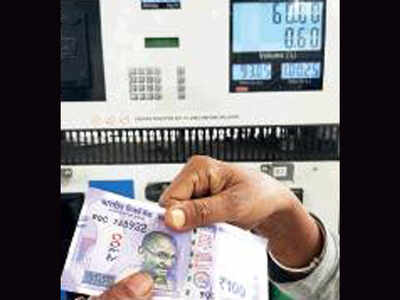Top Searches
- News
- City News
- bengaluru News
- Petrol hits a century in Bengaluru, diesel on brink of Rs 93 per litre
Petrol hits a century in Bengaluru, diesel on brink of Rs 93 per litre

The price of a litre of petrol in Bengaluru crossed Rs 100 on Friday
BENGALURU: After Mumbai and Hyderabad, Bengaluru became the third metropolitan city in the country where the price of petrol has shot past the 100-rupee mark. A litre of petrol in Bengaluru was selling at Rs 100.25 and diesel at Rs 92.97 on Friday.
A litre of petrol cost Rs 103.08 in Mumbai, Rs 100.74 in Hyderabad, Rs 98.14 in Chennai, Rs 96.84 in Kolkata and Rs 96.93 in New Delhi on Friday. Records show that petrol rate was Rs 71.97 in Bengaluru between March 16 and 27 in 2020, and it has an increase of Rs 28.20 in 15 months. Similarly, diesel prices went up from Rs 64.41 per litre during March 16-27, 2020 to Rs 92.97 now, a hike of Rs 28.56 in the same period.
In Karnataka, at least six districts — Bidar, Ballari, Koppal, Davanagere, Shivamogga and Chikkamagaluru — have crossed the Rs 100 mark.
In Ballari, petrol was sold at Rs 102.05 per litre and the diesel price was Rs 94.7 a litre on Friday.
Oil-marketing companies increased fuel rates for the 26th time in the past 46 days, pushing the petrol and diesel prices in the city to a life high. OMCs revise fuel prices daily based on the global refined products prices and dollar exchange rate. However, fuel prices were static from February 28, 2021 to May 3, 2021 due to elections in five states.
The rise comes at a time when daily fuel sales have declined due to Covid-19 restrictions. “Fuel sales have reduced by 40-50% due to travel restrictions and work-fromhome arrangement. Motorists will feel the pitch once the normalcy returns in afew months,” said A Tharanath, vice-president of Akhila Karnataka Federation of Petroleum Traders.
“The price variation between Bengaluru and other districts is mainly due to transportation costs from terminals. For instance, Ballari is getting supplies from Hassan, Mangaluru and Devanagundi instead of bordering Andhra Pradesh. If the Centre comes up with One India, One Tax, it will be possible for Ballari to get fuel from Andhra Pradesh,” he said.
Asked if there was an issue in displaying and billing fuel in three digits, he said all fuel outlets are already upgraded with an automated centralised system.
In addition to the base price of petrol, other components like dealer commission, excise duty and sales tax are increasing the price of petrol. However, the Centre is yet to bring fuel under the GST regime.
A litre of petrol cost Rs 103.08 in Mumbai, Rs 100.74 in Hyderabad, Rs 98.14 in Chennai, Rs 96.84 in Kolkata and Rs 96.93 in New Delhi on Friday. Records show that petrol rate was Rs 71.97 in Bengaluru between March 16 and 27 in 2020, and it has an increase of Rs 28.20 in 15 months. Similarly, diesel prices went up from Rs 64.41 per litre during March 16-27, 2020 to Rs 92.97 now, a hike of Rs 28.56 in the same period.
In Karnataka, at least six districts — Bidar, Ballari, Koppal, Davanagere, Shivamogga and Chikkamagaluru — have crossed the Rs 100 mark.
In Ballari, petrol was sold at Rs 102.05 per litre and the diesel price was Rs 94.7 a litre on Friday.
Oil-marketing companies increased fuel rates for the 26th time in the past 46 days, pushing the petrol and diesel prices in the city to a life high. OMCs revise fuel prices daily based on the global refined products prices and dollar exchange rate. However, fuel prices were static from February 28, 2021 to May 3, 2021 due to elections in five states.
The rise comes at a time when daily fuel sales have declined due to Covid-19 restrictions. “Fuel sales have reduced by 40-50% due to travel restrictions and work-fromhome arrangement. Motorists will feel the pitch once the normalcy returns in afew months,” said A Tharanath, vice-president of Akhila Karnataka Federation of Petroleum Traders.
“The price variation between Bengaluru and other districts is mainly due to transportation costs from terminals. For instance, Ballari is getting supplies from Hassan, Mangaluru and Devanagundi instead of bordering Andhra Pradesh. If the Centre comes up with One India, One Tax, it will be possible for Ballari to get fuel from Andhra Pradesh,” he said.
Asked if there was an issue in displaying and billing fuel in three digits, he said all fuel outlets are already upgraded with an automated centralised system.
In addition to the base price of petrol, other components like dealer commission, excise duty and sales tax are increasing the price of petrol. However, the Centre is yet to bring fuel under the GST regime.
FacebookTwitterLinkedinEMail
Start a Conversation
end of article
